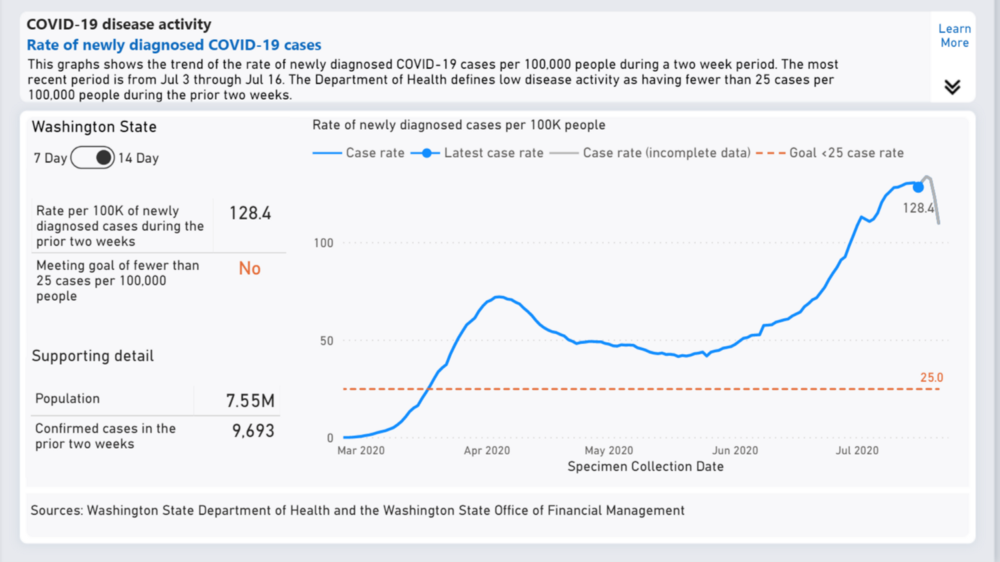 Remember how we flattened the curve? Washington State Department of Health Jul 24 · 3 min read The curve’s not flat anymore. This is an image from the risk assessment dashboards on www.coronavirus.wa.gov. Through June and July, the number of people diagnosed with COVID-19 in the previous two weeks per 100,000 population steeply increased. The number of people who have been tested has also increased, but the percent of people who test positive hasn’t drastically decreased. This is one way we can tell that the increase in the number of people with COVID-19 is due to increases in the spread of the disease in our communities and not just increases in testing. We’re all tired of this. But, we’re losing the momentum we had when we first started responding to COVID-19 in our communities. And this means more restrictions on businesses and gatherings with our friends and family. Today, the governor and secretary of health announced several updates to the Safe Start plan to help us have fewer, shorter and safer interactions with people outside our households. This includes reductions in the number of people who can be in a restaurant or fitness center at one time, and restrictions around other opportunities for gathering with other people for longer periods of time. This is a critical time when we all need to work together to prevent runaway growth in the number of people with COVID-19. We know how to do this — check out that chart again — we successfully reduced the spread of COVID-19 in April and May! The sooner we can get control of this virus again, the sooner we can open our communities, our businesses, and our schools. The most important thing you can do is reduce the amount of time you are around people outside your household. You can do that by having fewer, shorter, and safer interactions with other people. It’s still most effective for us to all stay home as much as possible. If you do go out, be sure to keep it quick, keep your distance from others, and wear your cloth face covering. Then wash your hands as soon as you get home. Practice compassion. This is a hard time for many of us. Washington Listens helps people manage stress and anxiety they may be experiencing because of COVID-19. If you or anyone you know is having difficulties managing stress, call the Washington Listens support line at 1–833–681–0211. Hours are from 9 a.m. to 9 p.m. Monday through Friday, and 9 a.m. to 6 p.m. Saturdays and Sundays. TTY and language access services are available by using 7–1–1 or their preferred method. Resources and self-help tips are available on walistens.org. More information. Stay tuned to our blog for more information on how you can help stop the spread of COVID-19. Sign up to be notified whenever we post new articles. Information in this blog changes rapidly. Check the state’s COVID-19 website for up-to-date and reliable info at coronavirus.wa.gov. Answers to your questions or concerns about COVID-19 in Washington state may be found at our website. You can also contact our the Department of Health call center at 1–800–525–0127 and press # from 6 a.m. to 10 p.m. Monday — Friday, and 8 a.m. to 6 p.m. Saturday — Sunday. Language assistance is available. Please note that this call center cannot access COVID-19 testing results. For testing inquiries or results, please contact your health care provider. Public Health Connection From the Washington State Department of Health Washington State Department of Health Protecting and improving the health of people in Washington State. Public Health Connection From the Washington State Department of Health
0 Comments
Leave a Reply. |
|